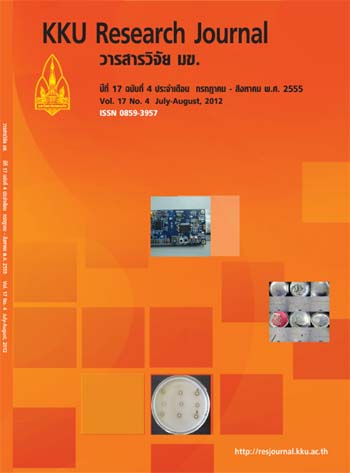Validity and discriminative ability on physical impairment relating to kyphosis using 1.7-cm block
Main Article Content
Abstract
Kyphosis is a common disorder that likely induces morbidity and mortality in elderly. Thus, a method of evaluation that can be performed by the elderly or family member is an important strategy to reduce disorder or plausible consequences. This study aimed to evaluate the correlation between the use of 1.7-cm block and flexicurve to measure kyphosis in elderly. In addition, the study compared functional endurance in elderly with different degrees of kyphosis as determined by using 1.7-cm block. The study was cross-sectionally conducted in 66 subjects, aged between 60-80 years. The subjects were classified into 3 groups which were mild (1 piece), moderate (2 pieces) and severe (3 pieces) kyphosis using 1.7-cm block. The results demonstrated that the assessment of kyphosis using 1.7-cm block had significant correlation with flexicurve (r=0.563, p<0.001). Moreover, subjects with mild kyphosis had more functional endurance that was clinically significant than those with severe kyphosis. The findings suggest the use of 1.7-cm block as a simple method for self-assessment and monitoring kyphosis.
Article Details
How to Cite
Thaweewannakij, T., Wongsa, S., Kamruecha, W., Khaengkhan, J., Wongkuanklom, J., Konkamtan, C., & Amatachaya, S. (2017). Validity and discriminative ability on physical impairment relating to kyphosis using 1.7-cm block. Asia-Pacific Journal of Science and Technology, 17(4), 660–670. retrieved from https://so01.tci-thaijo.org/index.php/APST/article/view/83276
Section
Research Articles


